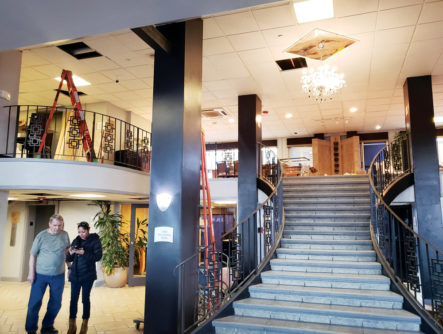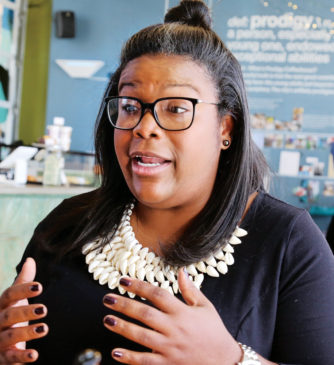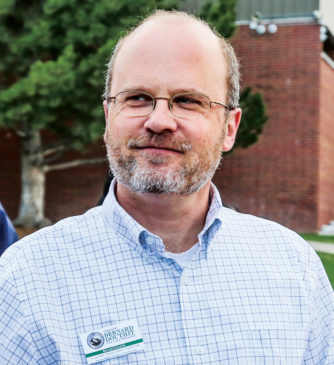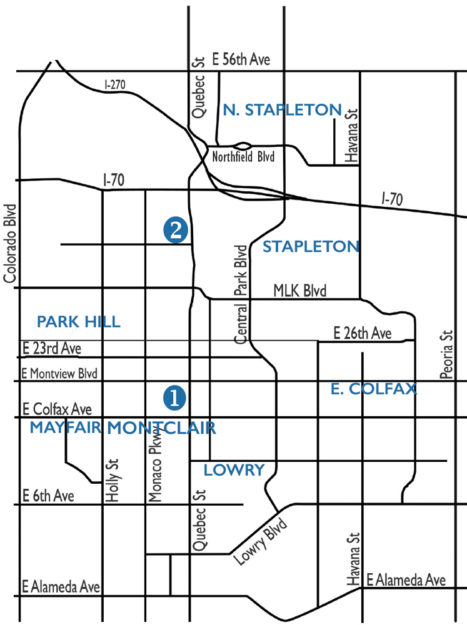1) East Area Plan Update: From “Lipstick on a pig” to “My community is open to anyone.”
In late November, over 450 community members came together—in body if not in spirit—to discuss the East Area Plan (EAP). The EAP offers a twenty-year plan and vision for the East Colfax corridor, and the Nov. 23 meeting at Johnson & Wales University demonstrated once again that there are almost as many concerns as there are individuals who call the corridor home. “From my perspective, you’re looking at a relatively unsavory area of Colfax, where you have an opportunity to maybe do something better, putting lipstick on a pig, to kind of improve that area. But what is it doing to the neighborhood that is established, the people who have lived here and raised families for 40, 50, 100 years, that have put their blood, sweat and tears, into their homes? You’re going to come in here and put in affordable housing, and for what? What’s the gain for the people who live here?” asked Debra Zupancic, a Park Hill resident, to considerable applause.
As Zupancic’s words suggest, the meeting was contentious at times, with people disagreeing with the plan’s recommendations, process, and timeline at different points. Some new issues also emerged. “My community is open to anybody and as you age, you will likely join us,” remarked community organizer and East Colfax Community Collective member Dawn Howard. She raised concerns about planners’ silence on universal design, an approach to design that ensures greatest accessibility to a public of diverse ages, sizes, abilities, and disabilities. As at previous meetings, housing density, traffic speeds, parking, building height, the BRT (Bus Rapid Transit), and affordable housing were other points of discussion. Meeting materials, updated draft recommendations, and surveys are online at www.denvergov.org/eastplan.
2) Community Donates Welcome Baskets for New Neighbors Who Have Been Homeless

Chalonie Craighead of Colorado Coalition for the Homeless meets with the site engineer at Fusion Studios, formerly the Quality Inn.
Following the announcement that the Quality Inn at 37th and Quebec is being remodeled as long-term housing for singles and couples experiencing homelessness, individuals and organizations have been contributing to a “welcome home” basket drive. Pledges have been received for about 100 of the 139 baskets needed to equip the rooms at Fusion Studios with kitchenette and bathroom necessities. Basket commitments have come from local Girl Scout, Brownie, and Cub Scout troops, as well as from individuals. “It is so nice to see a community coming together with this intensity!” says Chalonie Craighead with the Colorado Coalition for the Homeless. “We are so happy our folks will have the opportunity to feel like a part of the neighborhood. I think the baskets will help us do that.” To donate a basket, contact Craighead at ccraighead@coloradocoalition.org; you can also specify a gift for Fusion Studios in the instructions line at https://www.coloradocoalition.org/donate-now.
Numerous renovations are being made, including filling in the old swimming pool, and the first residents are expected to move in early in 2020. See the November Front Porch for details on the project.
3) Familiar Faces—Bacon and Douthit—Jump into State House District 7 Race
James Coleman’s run for State Senate created an opening in House District 7. The Front Porch asked two local candidates, “What are the three most pressing issues in House District 7 and what are your qualifications to address them?” A third candidate, Simon Maghakyan, has registered to run in the HD7 race.

Jennifer Bacon, currently vice president of the DPS School Board, says she would bring a voice for public education to the statehouse.
Jennifer Bacon says her first priority is to really push the state to support education funding. Her second priority is smart development—with pushing against fracking and building affordable housing as the main efforts. Third is job security and the ability to earn livable wages.
She would want to be on the House education committee, pointing out that James Coleman was the only Denver representative on it. Bacon says her colleagues on the School Board are supportive of her run. “We all agree that it would be absolutely tremendous to have a voice for public education in the state house.”
In talking about the needs of families, Bacon points out that District 7 is one of the most diverse districts when it comes to ethnicity and income. Through her work in education, she has observed, “schools are kind of like a microcosm of state issues.” She says she will assess new legislation through the lens of its impact on families. “I just want to be sure that the prioritization of what we’re spending our money on goes directly to those who need it the most. Those who work hard should to be able to live and thrive here.”
“I’m most specifically interested in how do we come to a conclusion about how much it actually costs to live here? That means we look at prices of housing and we try to create a culture in which employers really respect their employees [by paying enough for them to live in the community].”
Bacon observes that Coloradans are proud of how much taxes they pay compared to other states, which is pretty low, but says “…we need to figure out, while not overburdening with taxes, how to prioritize and push for the places we want to make investments.”
Bacon, currently the Vice President of the DPS school Board says in her time on the school board, a non-paid position with no staff, she has “figured out tricks on how to manage my school board work.” With those skills, she says she can manage the demands of that position while working as a state legislator. She believes her experience as a teacher, an organizer, and an attorney—and listening to what people need—give her the ability to articulate that in policy. She believes in the power of partnerships, and says that’s reflected in her leadership style. She wants to get out into the community listening to people and she wants people to feel they are able to touch the decisions being made in the legislature.

Bernard Douthit, who previously ran for State Treasurer, says he would add an economics and finance skillset to the legislature.
Bernard Douthit says the number one issue at the moment is protecting the environment. Number two is people, particularly people who work. His third priority is public banks—something he ran on in his bid for state treasurer. And he adds education as his next priority.
On the environment, Douthit cites the recent incident when ash spewed from the Suncor refinery in Commerce City and says we need to beef up monitoring of our air quality and have more and better reporting all around the district. He’s in favor of doing everything we can do legislatively to support the environment, whether it’s tax incentives or better regulations. “I just think there’s a lot of things we can do.”
To support working people, he says, “Everyone knows we’ve got a huge problem with inequality in this country…and all the evidence I have looked at demonstrates that one of the key ways to solve this problem is to pass legislation. We have to do whatever we can from a policy standpoint to support the rights of workers…We need to do more to make it easier for them to organize and bargain collectively…[workers like] teaching assistants at universities, health care workers, Uber and Lyft drivers.”
Douthit believes the state needs a public bank for deposits of its tax receipts instead of using a Wall Street bank. North Dakota has had a state bank for 100 years. It’s taxpayer money that can be used for lower-interest loans for priorities set by the state such as student loans, infrastructure or affordable housing. A public bank would not be competing with any local banks or credit unions; he says it actually becomes another source of capital that they can partner with to make loans.
In education, he expresses concern about how to get the best educational outcomes. “I think we all can agree…that we want smaller class sizes, we want every school to have the best facilities possible; 21st century facilities with everything working; and we want to pay our educators more and demonstrate that they’re valued…I think the better we treat our teachers, we’re going to see better results with with our kids.”
Douthit says he believes the state is leaving potential federal funds for schools “on the table.” With legislative action, the state board of education could do a better job of training people in school districts on the “tedious paperwork” required to claim reimbursements from the federal government.
Douthit’s background is in economics and finance. He says,“Having that skillset is something I would hope would really add a lot of value in the state legislature.”
4) You can make a difference…
—Recycled glass bottles are turned into new glass here on the Front Range…but only 67% of glass containers get recycled.
—80% of cardboard is getting recycled— but only about 50% of aluminum cans in Denver get recycled
—Denver could cut recycling contamination in half if recyclables weren’t bagged. Bagged recyclables are thrown in the trash.
—The average Denver household sends 306 pounds of recyclable material to the landfill each year. Don’t miss recycling holiday boxes, beverage bottles and aluminum cookware.




0 Comments